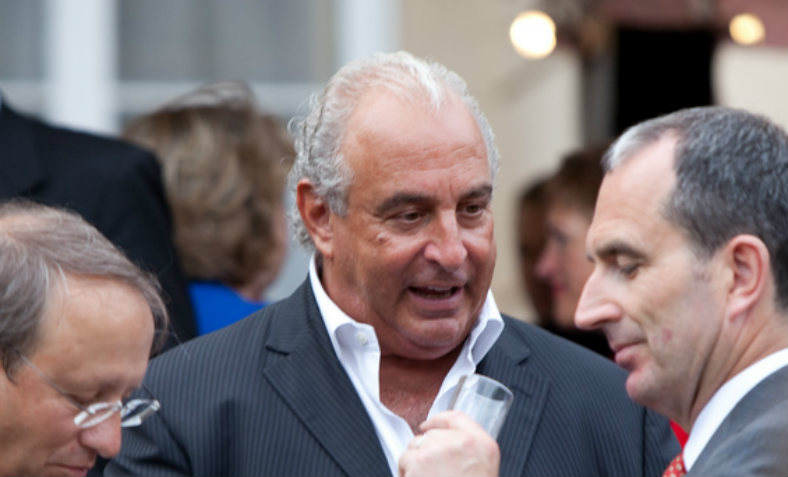 Philip Green at the Financial Times summer party, 28 June 2011. Photo: Flickr/Financial Times
Philip Green at the Financial Times summer party, 28 June 2011. Photo: Flickr/Financial Times
Philip Green is a particularly odious example of the exploitation endemic to capitalism, and our response needs to confront the system that enables him, argues Mona Kamal
Hiding assets offshore to avoid tax, refusing to pay workers a living wage, plundering employees’ pension funds, racial abuse and sexual harassment of employees. The point at which all these outrages converge is called Philip Green.
Truly, it is difficult to know where to begin in cataloguing the abuses of Philip Green. This is the man who registered his businesses under his wife’s name in Monaco to avoid paying taxes, whilst simultaneously relying on the taxpayer to provide the necessary tax credit top-ups to the poverty wages he pays his workers.
Time and again Arcadia workers – the individuals off whose backs Philip Green has amassed vast wealth – have had to fight to afford a decent standard of living. In November 2016 workers at the Topshop Distribution Depot, paid the minimum wage of £7.20 an hour, had their claim for a living wage of £8.45 declined, resulting in walkouts by 200 workers.
Also in 2016, a year which saw Arcadia group report an annual profit of over £250m, cleaners and shop-floor staff protested outside the flagship store to demand a living wage. After a campaign spearheaded by two cleaners and the United Voices of the World Union, cleaners’ wages were eventually raised by 30p to match the London living wage.
In 2015, 11,000 BHS employees lost their jobs when Philip Green sold the failing company for one pound. The sale came after he had plundered employees’ pension funds, leaving 20,000 retirees suddenly facing uncertain futures after learning they would receive significant cuts to their pension entitlements.
When he has shown himself capable of this kind of callousness and disdain towards his workers and their livelihoods, it was no surprise to me that Philip Green was named as the businessman responsible for harassment and abuse of employees. His response of course was a denial: “To the extent that it is suggested that I have been guilty of unlawful sexual or racist behaviour, I categorically and wholly deny these allegations.” If that’s the case one wonders why he bothered paying seven-figure sums to the women in question to prevent them from making the accusations publicly in the courts.
Women are already calling for boycotts of Topshop using the hashtag #PinkNotGreen, which began circulating after a separate incident last week where Topshop refused to promote a book about feminism by writer Scarlet Curtis. A concession promoting the book was brought down after Philip Green himself branded it too controversial. But a boycott is surely not enough.
It is easy to denounce the glaringly obvious greed and callousness of individuals such as Philip Green. Defenders of capitalism will be quick to portray him as an extreme or isolated example of capitalism gone off the rails; the actions of ‘a bad apple’. But he is no such thing. ‘Sir’ Philip Green, lauded by the establishment and awarded a knighthood by an equally dishonourable Tony Blair, is no anomaly.
The foundation on which the whole capitalist system is built, and what it continues to rely upon, is exactly the type of rampant exploitation which Philip Green embodies – he just happens to be a very visible, and particularly ugly example of it. Boycotting Topshop clothes is a start, but an inadequate response if we fail to confront the rigged economic and legal system which enables Philip Green and many like him to behave in this parasitic manner.

